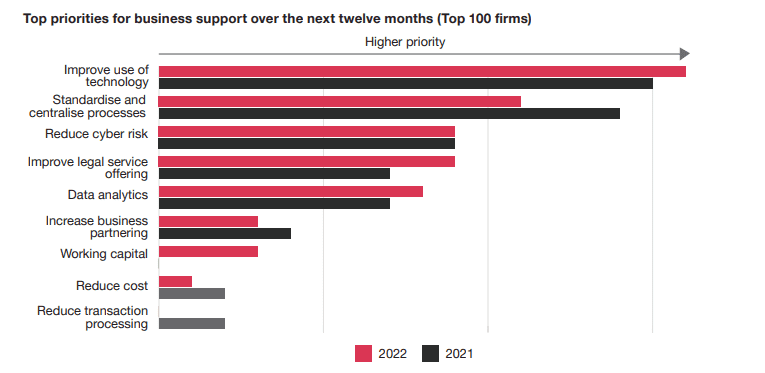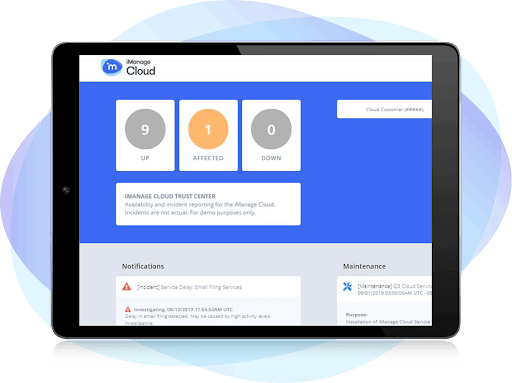The best legal document management software is one that is tailored to the practice of your law firm. It covers recurring needs like gathering data, storing information, exchanging papers, making templates, etc. In choosing legal software for document management in your law practice, you should consider the key features mentioned in this article and possible potential needs.
Defining Legal Document Management Software
Legal document management software is a part of free legal software; it allows lawyers to store, organize, and access documents from one central repository. These solutions empower lawyers to work more collaboratively and efficiently, no matter where they are. Legal document management software also enhances legal case management and the security of client documents by preventing unauthorized access.
Why Most Law Firms Should Use Legal Document Management Software
Legal document management software is valuable for law firms looking to improve their workflow efficiency, reduce costs, and enhance security and compliance. By improving collaboration, productivity, organization, and document accessibility, law firms can focus on delivering high-quality legal services to their clients while meeting the challenges of a digital world. Therefore, law firms should use document management software to streamline their document management processes and stay competitive in today’s digital world.
84% or the top 100 firms have invested in Document Management Systems – PwC
As a lawyer, you know that drafting documents, whether contracts, leases, NDAs, or other legal documents, can be a huge time process. With a legal document automation system, in just a few clicks, you can have the template for your document and then fill in the necessary information for your case.
In this article, we will explore the features to consider when choosing legal software for documentation, the benefits of using document management software for law firms, and an overview of the best legal document management software in 2023.
Key Features to consider when choosing Legal Document Management Software
When managing legal documents, law firms must ensure they have the right tools to streamline their documents and case management processes. With so many options available, it can be challenging to choose the right one. Let’s discuss the key features law firms should consider when choosing legal document management software.
- User-Friendly Interface: A user-friendly interface is essential for legal document management software. Law firms should look for legal software that is easy to navigate with intuitive controls and a clean layout. The chosen software should allow users to quickly locate the documents they need and provide easy access to the features they use most frequently, just like MYLegalSoftware. The interface should also be customizable to meet the law firm’s specific needs.
- Customizable Metadata Fields: Customizable metadata fields are an essential legal document management software feature. Metadata is information about a document, such as its author, date created, and keywords. Law firms should look for software that allows them to customize metadata fields to fit their specific needs. Customizable metadata fields can enhance legal case management by helping law firms organize and search for documents more efficiently, making it easier to find the right documents when needed.
- Advanced Search Capabilities: Legal document management software should have advanced search capabilities to help law firms locate the necessary documents quickly. The software should allow users to search for documents by keyword, date, author, or other metadata fields. The search results should be displayed clearly and organized, making it easy for lawyers to find the document they need.
- Robust Version Control and Document Tracking: Version control and document tracking are essential for legal document management software. Law firms should go for software that tracks document changes, records who made the changes, and records when they were made. The software should also provide robust version control, allowing users to access previous versions of a document if needed.
- Integration with Other Legal Software and Tools: Legal document management software should integrate with other legal software and tools. For example, Mylegalsoftware integrates with Google Docs and DocuSign. Other software integrates with e-discovery, case management, and document review tools. This integration can help law firms streamline their workflow, reducing the time and effort required to manage legal documents.
- Secure Sharing and Collaboration Options: Finally, legal document management software, especially when used as legal case management software, should have secure sharing and collaboration options. The software should allow users to securely share documents with colleagues, clients, and other parties. It should also provide collaboration tools, such as commenting and editing, to facilitate collaboration between team members. The software should have advanced security features like encryption and access controls to protect confidential information.
80% of the top 100 firms have a dedicated cyber security resource – PwC
Legal Document Management Software – A Guide to Features
The most feature-rich legal document management software systems provide lawyers and law firms with document and file storage, document profiling or metadata, full-text search, versioning capabilities, and more. These features allow lawyers to keep track of their documents, share them with others, and find the information on the cases they need quickly and easily. These features of effective legal case management software are covered briefly below:
1. Document and File Storage
Document & file storage is a fundamental feature of legal document management software. The software should provide secure storage and retrieval of all documents and files. The storage should be scalable and flexible, allowing law firms to store documents and files of different sizes and types. Document management software. It allows users to add tags or attributes to a document, such as author, date created, or keywords, which helps with effective case management. Legal case management software stands out as a vital organizational tool.
2. Document Profiling or Metadata
Document profiling/metadata is an essential feature of legal document management software. It allows users to add tags or attributes to a document, such as author, date created, or keywords.
3. Full-Text Search
Full-text search is a powerful feature of legal document management software. It allows lawyers to search for a specific phrase or keyword within the content of a document. This feature can help law firms quickly locate relevant documents, even if they don’t know the title or author.
4. Unique Document ID
The unique document ID feature in legal software tags it as a digital fingerprint, assigning a distinctive code to every document. This unique ID simplifies tracking and management and enhances collaboration within law firms. This feature ensures no document is lost in legal contexts where precision is crucial.
Legal professionals can swiftly access specific files without navigating complex structures. This efficiency fosters seamless teamwork, facilitating smooth discussions and collaborative projects. Legal Case Management Software, equipped with unique document IDs, transforms how legal experts interact with their documents.
In the bustling world of law, having a unique document ID isn’t just a convenience; it’s a necessity. It empowers legal professionals to work smarter, emphasizing the pivotal role of legal case management software in legal software solutions.
5. Document Check-Out / In
In the dynamic space of legal software, the document check-out/in feature stands as a key element within legal case management software, guaranteeing a seamless collaborative experience while upholding the integrity of critical documents.
This fundamental capability empowers users to temporarily secure specific documents, preventing unauthorized modifications during the editing process. Such precision is vital in legal contexts, where accuracy and confidentiality are paramount.
Legal professionals often handle highly confidential materials, necessitating a meticulous approach to document management. Document check-out/in functionality within Legal Case Management Software ensures a controlled environment, allowing professionals to work confidently.
Once edits are finalized, the document is seamlessly checked back in, facilitating effortless team collaboration. Since the landscape of legal practices is ever-evolving, this feature exemplifies the meticulous attention to detail offered by Legal Case Management software solutions.
By blending security with collaboration, these tools redefine efficiency for legal professionals, ensuring streamlined workflows and safeguarded data in every case.
6. Microsoft Office Integration
Incorporating Microsoft Office integration within legal document management software significantly enhances efficiency. Lawyers can easily edit and save documents directly from applications like Word, Excel, and PowerPoint. This integration streamlines editing, reducing time spent managing documents. Trust in software that simplifies your workflow, elevating your law firm’s productivity. Elevate your practice with seamless Microsoft Office integration—a game-changer in legal software.
7. Document Version Management
Understanding the nuances of document version management is pivotal in legal document management software. This indispensable feature empowers users to meticulously track and oversee diverse document versions, ensuring effortless access to prior iterations when required.
For law firms, this capability shields them against errors and discrepancies, guaranteeing that they are perpetually engaged with the most recent version of crucial documents. As a seasoned expert, I emphasize the significance of this tool, as it not only enhances efficiency but also safeguards the integrity of legal proceedings.
From experience, I’ve witnessed firsthand how this feature transforms the document management landscape, providing an unmatched level of precision and control. Trust me when I say that reliable legal document management software, equipped with robust version management, is the cornerstone of a seamless and error-free legal practice.
8. Email Management
Effective communication is paramount in legal proceedings, and this feature seamlessly integrates email correspondence into the document management system. Users, especially law firms, can efficiently manage their email correspondence by storing and organizing emails within the system.
As a legal expert, I’ve witnessed firsthand the chaos that can arise from disorganized emails. That’s why I emphasize the importance of this feature. It enhances efficiency and ensures that crucial emails are never lost in the shuffle.
As a trusted authority in the legal field, I can attest to the transformative power of email management within legal document management software. It’s not just a tool; it’s a lifeline for any law firm striving for precision and excellence in their practice.
9. Permissions and Access Management
Safeguarding sensitive information is paramount in legal document management. Permission and access management step in as crucial guardians of confidentiality. As a seasoned expert, I recognize this feature’s pivotal role in ensuring that only authorized personnel gain access to sensitive documents.
Having seen several scenarios in legal practice, I understand the critical need for this level of security. Administrators can meticulously control document access, tailoring permissions for various user roles. This meticulous control fortifies confidentiality and instills trust in clients, knowing their information is in capable hands.
In my esteemed experience, I’ve witnessed the transformative impact of permission and access management within law firms. It’s not just a feature; it’s a shield, protecting the essence of legal practice—trust and confidentiality.
10. Accessing Favorite and Recent Documents
In legal document management, efficiency is key. That’s why features like favorites and recent documents hold immense value. Imagine having your most essential documents at your fingertips, precisely where you need them. As a seasoned expert in the legal field, I recognize the significance of these seemingly small conveniences.
I’ve seen how these features streamline workflows. Whether retrieving frequently referenced documents or revisiting recently accessed files, these functionalities save valuable time. They’re not just convenient but productivity boosters, ensuring that legal professionals can focus on what truly matters—serving their clients with unparalleled dedication and expertise.
These features aren’t just buttons but pathways to enhanced productivity and seamless client service. Trust me, in the fast-paced world of legal practice, every second counts, and these features make every second more valuable.
11. Matter Notes
Matter notes, an often overlooked feature, play a pivotal role in fostering effective teamwork. As a legal expert, I understand the value of clear communication and context in every document. Imagine a scenario where team members can seamlessly add notes and comments to documents, enriching them with vital context.
These annotations serve as a roadmap, guiding discussions and ensuring everyone is on the same page. From case strategies to client preferences, matter notes encapsulate shared knowledge. In my years of practice, I’ve witnessed how these seemingly simple notes transform collaboration.
They bridge gaps in understanding, clarify complex legal jargon, and enhance overall communication. Trust me; precision and clarity are non-negotiable when it comes to legal matters. So, when you explore legal case management software, remember the power of matter notes.
They aren’t just annotations; they’re the threads weaving a tapestry of effective teamwork, ensuring your legal practice operates with unparalleled cohesion and efficiency.
12. Practice Management Integration
As a seasoned legal expert, I recognize the pivotal role that seamless integration plays in optimizing workflow. Practice management features elevate your software, enabling it to harmonize with billing and timekeeping systems, creating a well-oiled machine for your law firm.
Picture this: Your document management software effortlessly syncs with billing and timekeeping applications, eliminating the need for manual data entry and minimizing the chances of errors. This integration isn’t just about saving time; it’s about enhancing accuracy and ensuring that every billable hour is accounted for.
Having witnessed the transformative impact of integrated practice management tools, I can attest to their invaluable benefits. They eradicate redundancies, simplify complex processes, and empower your firm to focus on what truly matters: delivering exceptional legal services.
When you delve into legal case management software, consider the seamless synergy with practice management features. It’s not just about convenience; it’s about empowering your practice to thrive in a digital landscape where efficiency isn’t just a luxury but a necessity. Trust in the power of integration is the cornerstone of a future-ready legal practice.
13. Multi-Factor Authentication
Security isn’t just a feature; it’s a fundamental necessity. That’s where Multi-Factor Authentication (MFA) steps in, ensuring your system’s defense is multi-layered and robust. Imagine this scenario: To log into the system, you need a password and a second authentication factor, like a fingerprint scan or a security token.
This extra layer of protection enhances security and fortifies compliance measures. Having navigated the intricate landscape of legal software, I’ve seen firsthand the significance of MFA. It’s not merely a safeguard; it’s your shield against unauthorized access and data breaches.
In a world where digital threats loom large, MFA stands tall as your trusted guardian, ensuring your sensitive legal information remains impenetrable. Embrace MFA as a security feature and a testament to your commitment to safeguarding your practice and client data.
It’s more than an additional step; it’s your firm’s assurance of security and compliance, a vital investment in the integrity of your legal operations.
Benefits of Using Document Management Software for Law Firms
1. Time-Saving Benefits: Elevate Your Productivity
As a seasoned legal expert, I understand the precious hours attorneys spend managing documents manually. That’s why investing in cutting-edge legal document management software is invaluable. By automating mundane tasks like filing, searching, and retrieving documents, this software empowers law firms to reclaim precious time.
Imagine a seamless process where documents are swiftly scanned, uploaded, and automatically indexed, ensuring effortless access. Now, attorneys can devote more time to delivering exceptional legal services to their clients, confident that their document management is handled efficiently and carefully.
Experience the liberating efficiency of document management software tailored specifically for law firms. Discover a world where your focus remains steadfast on your clients while the software handles the rest with finesse and precision.
2. Save Costs with Digital Efficiency
Legal document management software isn’t just about convenience; it’s a cost-saving powerhouse. Traditional paper-based storage demands substantial office space and dedicated staff to manage countless files. By transitioning to digital solutions, law firms liberate valuable space, reduce reliance on manual handling, and slash expenses on paper, ink, and supplies. Embrace digital efficiency, boost your savings, and enhance your firm’s financial health.
3. Improved collaboration and productivity
In the modern legal landscape, collaboration is key. Document management software facilitates seamless teamwork, connecting colleagues across offices or continents. Multiple users can access and edit documents simultaneously, ensuring real-time collaboration. Sharing documents with clients and partners becomes effortless.
Plus, robust version control safeguards against outdated files, boosting productivity and ensuring your team works at its most efficient, always in sync, and never misses a beat.
4. Enhanced security and compliance
Law firms are responsible for safeguarding their clients’ confidential information. Document management software provides advanced security features for legal case management, such as access controls and encryption, to protect sensitive client information from unauthorized access or data breaches. Document management software also ensures compliance with data protection laws such as GDPR and HIPAA, which can help law firms avoid costly legal penalties.
5. Better organization and accessibility of documents
I am sure you know that efficient document management is the backbone of a successful law firm. With document management software, organizing files becomes intuitive. You can group documents by matter, client, or practice area, ensuring swift access when needed.
You can also harness the power of full-text search capabilities, cutting down on hours traditionally spent hunting for specific files. With this, you experience unparalleled organization and accessibility, transforming your workflow into a seamless, stress-free process.
Analyzing the Best Legal Document Management Software for Small Law Firms in 2023
As the world becomes increasingly digitized, the need for a secure and efficient legal case and document management is more important than ever. Document management software can help law firms streamline their workflows, improve collaboration, and reduce the risk of errors or data breaches. With so many options available, determining which software best suits your needs can be difficult.
Best Legal Document Management Software for 2023 – The List
Using the information shared so far, our team meticulously researched and curated a list of the top document management software tailored for law firms in 2023 that meets the core requirements. This comprehensive guide aims to assist you in making an informed decision about the best document management solutions for your legal practice.
1. MyLegalSoftware
MyLegalSoftware is a cloud-based practice management software designed specifically for attorneys. It offers powerful document management features, including storing and organizing documents in a centralized location, tracking document versions and revisions, and setting access controls to ensure that only authorized personnel can view or edit sensitive documents.
MyLegalSoftware also integrates with popular document editing software, such as Google Docs and DocuSign, making it easy to collaborate on documents with team members or clients.
2. NetDocuments
NetDocuments, can be considered the pinnacle of cloud-based document management. Designed with top-notch security, it employs two-factor authentication and robust data encryption, safeguarding your clients’ sensitive information. Organize documents effortlessly by matter or client, utilizing features like document versioning, workflow automation, and lightning-fast full-text search capabilities.
Seamless Integration: NetDocuments seamlessly integrates with your favorite email and calendar applications, offering unparalleled ease in managing documents alongside vital information. Elevate your law firm’s efficiency and security with NetDocuments, your trusted cloud companion.
3. Clio
Clio, the comprehensive cloud-based practice management software tailored for law firms, offers an integrated suite of tools that includes robust document management features. Effortlessly organize documents by matter, client, or practice area. You enjoy essential features like document versioning, collaborative tools, and the flexibility to craft custom document templates.
Efficient Integration
Clio integrates with leading document editing software, including Microsoft Word and Google Docs. This integration simplifies document editing and collaboration, enhancing your workflow. Elevate your law firm’s document management experience with Clio, your trusted partner in efficiency and organization.
Check out a video review from Capterra, Click image to view.
4. iManage
iManage is the go-to document and email management software favored by prominent law firms and corporations. Its advanced security features, including robust data encryption and multi-factor authentication, ensure the utmost protection for sensitive information. Explore a suite of features, including document versioning, comprehensive full-text search capabilities, and customizable document workflows.
iManage knowledge work platform empowers law firms to work intelligently and securely.
Seamless Integration
iManage integrates with leading document editing software, including Microsoft Word and Adobe Acrobat. This integration streamlines document creation and editing, enhancing your workflow efficiency. Experience unparalleled document management tailored for large-scale legal operations with iManage, your trusted solution for security and productivity.
5. Zoho Docs
“Zoho Docs: Elevating Law Firms’ Document Management”
Explore Zoho Docs, a cutting-edge cloud-based document management system designed to revolutionize document organization and collaboration for law firms. Delve into many features, including document versioning, collaboration tools, and customizable document templates, empowering seamless teamwork and client interactions.
Effortless Integration
Zoho Docs effortlessly integrates with leading document editing software, including Microsoft Word and Google Docs, streamlining your editing processes. Experience unparalleled ease and efficiency in managing documents and collaborating with clients and team members. Elevate your firm’s document management capabilities with Zoho Docs, which is your key to enhanced productivity and collaboration.”
6. LexWorkplace
“Elevate Your Legal Practice with Lex Workplace”
Discover LexWorkplace, a specialized cloud-based document and email management software tailored for law firms. Designed with legal professionals in mind, LexWorkplace meticulously organizes documents and emails by Client and Matter, ensuring seamless workflow management.
Effortless Email Management
LexWorkplace simplifies email organization by allowing you to save emails directly to a specific matter. With intuitive navigation, effortlessly locate emails, documents, and information related to clients and matters.
Robust Security Measures
Rest easy knowing your data is safeguarded with LexWorkplace’s advanced security features. Benefit from two-factor authentication, data encryption in transit and at rest, and geographically redundant data centers. LexWorkplace ensures your sensitive legal information remains confidential and protected.
Empowering Your Legal Team
Experience the convenience of full-text search functionality, enabling quick retrieval of client-specific information, documents, and emails. LexWorkplace operates seamlessly on both Windows and Mac computers, providing a user-friendly interface for your legal team. Elevate your legal practice with LexWorkplace – where efficiency meets security, tailored exclusively for law firms.”
Steps to Choose a Document Management Software for Your Law Firm
Explore the fundamental steps vital for every firm embarking on the journey to choose the right law practice management software. Navigating legal technology requires a thoughtful approach, and understanding these crucial steps can significantly impact your decision-making process.
By delving into the core considerations, you can ensure that the software you choose aligns seamlessly with your firm’s unique needs, fostering enhanced efficiency, streamlined workflows, and, ultimately, success in your legal endeavors. These are essential steps every firm should take when selecting law practice management software:
1. Assess Your Firm’s Needs and Goals
The first step in choosing the best document management software for your law firm is to assess your firm’s needs and goals. Determine the types of documents you need to manage, the number of users who will access the software, and the software’s required features. Consider whether you need a cloud-based solution or an on-premises software solution.
2. Research and Compare Software Options
Once you have assessed your firm’s needs and goals, research and compare software options. Look for software that meets your requirements, has a user-friendly interface, and offers adequate support and resources. Check online reviews and ask for recommendations from other law firms to understand the software’s reliability and functionality.
3. Consider Software Pricing and Implementation Costs
When choosing management software, pricing, and implementation costs are other important factors. Some software may require upfront fees, while others may charge a subscription or per-user fee. When comparing software options, consider any additional costs, such as implementation, training, and support fees. Look for software that fits your budget and provides a good return on investment.
3. Test Software Before Committing to a Purchase
Once you have narrowed down your options, testing the software before committing to a purchase is crucial. Most software vendors offer a trial period, during which you can test the software’s functionality and features. During the trial period, test the software with a group of users to get feedback on its usability and effectiveness.
Signs Your Law Firm Needs Legal Software
Identifying the opportunity to integrate legal software into your firm’s operations can be a transformative decision. If your firm grapples with challenges like disorganized document management, inefficient timekeeping, or lack of streamlined communication, it’s a clear sign that legal software could be your solution.
These steps indicate how soon you must integrate legal document management software into your legal practice.
1. Your Files/Documents are Fragmented and Scattered
If your firm’s document files are fragmented and scattered across multiple locations, finding the information you need quickly can be challenging. Legal document management software can help consolidate your files and documents in a single location, making accessing and managing them easier.
2. Your Filesystem is a Wild West of Unstructured Folders
Is your computer’s file system as messy as the Wild West, full of unstructured folders that challenge finding anything? Legal software acts as the sheriff, bringing order to the chaos. It transforms scattered files into a well-organized system, simplifying your searches and ensuring every document has its place. No more digital wilderness—legal software turns your files into a structured, efficient landscape, saving time and reducing stress.
3. You Need to Classify and Annotate Documents
If you struggle to classify and annotate documents accurately, it’s a sign that your workflow might benefit from legal software. Imagine legal software as a magical tool that helps sort and organize documents. It creates special labels (metadata fields) and colorful markers (tags) so that every document finds its perfect place, just like sorting toys into different bins. It ensures nothing is ever lost, and everything is easy to find.
4. You Need Robust Search
In the vast landscape of digital documents, the quest for specific information can feel like searching for a needle in a haystack. Legal practice management software becomes your guiding light, offering advanced search capabilities tailored for legal professionals. With the ability to search based on keywords, dates, file types, and more, this software ensures swift and precise information retrieval. No more endless scrolling or frustrating searches—legal software streamlines the process, making finding essential data quick, efficient, and frustration-free.
Comprehensive Legal document Management with MyLegalSoftware
Finding the right management software can be overwhelming in the rapidly changing legal technology landscape. MyLegalSoftware is here to simplify your search. Designed exclusively for attorneys, our platform offers essential features such as unlimited document storage, precise permission controls, advanced search functionality, seamless document automation, and secure electronic signatures.
We focus on efficiency and security, ensuring your legal operations are streamlined and protected. Our commitment goes beyond standard offerings to enhance your legal experience. Curious to see how it works? Watch our free demonstration on ‘How Law Firms Use MYLS,’ and discover a new standard in legal workflow.”












